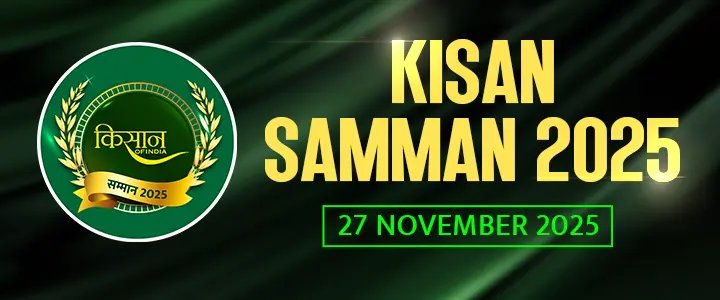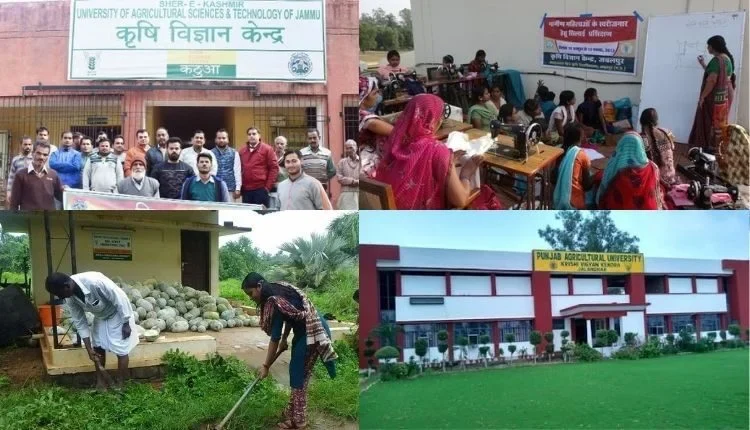KVK: How did Krishi Vigyan Kendras become best friends of farmers?
The first KVK was formed in Puducherry in 1974 and in 2005 the policy was made to make it in every district
The best friend of farmers is their nearest Krishi Vigyan Kendra. Krishi Vigyan Kendras (KVKs) have been set up in every rural district of the country to guide the farmers and connect them with scientific activities related to agriculture. Its main objective is to prepare the ground for connecting farmers and agricultural scientists and adopting new agricultural research. Through KVK, farmers are given weather information and necessary training in local language and dialect, besides every aspect of farming. Generally, no fee is charged from farmers for the convenience they get from Krishi Vigyan Kendras, but if any capital goods are provided to the farmers, they may have to pay a price in return.
KVK has a ‘frontline role’ in the world of farming
In the development of every aspect related to agriculture, the role of Krishi Vigyan Kendra is that of frontline organisation. That is why with the changing times, establishment of Krishi Vigyan Kendra in every district has been made mandatory. Its function is to play the role of a bridge between agricultural research organizations and farmers run by various departments of the state governments. Keeping in view its role and resources, KVK caters to the needs of selected farmers of their district. By the way, the other departments of the state government are responsible for the implementation of development plans related to the farmers or other agricultural population of the entire district.
Jurisdiction of KVKs
All the Krishi Vikas Kendras of the country are continuously working to increase the production, productivity and income of the farmers in agriculture. Under this, the latest technology developed in agricultural research institutes works in the direction of tailoring the farmers to the specific areas and applying them to the land. On-farm testing of new farming systems and techniques is done through KVKs. Performing frontline demonstrations and training of farm people to establish their production capacity in farmers’ fields, supporting public, private and voluntary sector initiatives to improve the agricultural economy of their district and scientific centers is also the responsibility of Krishi Vigyan Kendras.
It is the job of Krishi Vigyan Kendra to provide seeds, planting material, bio-agents and improved livestock to the farmers and to participate again in its production and to create awareness among the farmers and rural society for all the above purposes. During the last five years, Krishi Vigyan Kendras have been further enabled with other infrastructure facilities like Pulses Seed Hub, Soil Testing Kits, Minor Irrigation Systems, Integrated Farming System Units, Agricultural Machinery and Equipments, District Agro-Meteorological Units etc.
Network of 727 KVKs formed in 50 years
So far 731 Krishi Vigyan Kendras have been established out of 742 districts in 36 states and union territories of the country. Governments have strengthened many infrastructure facilities in KVK like Pulses Seed Hub, Soil Testing Kits, Micro Irrigation System, Integrated Farming System, Agricultural Machinery and Equipment, District Agricultural Weather Unit etc. However, till now there are only 657 Krishi Vigyan Kendras which have their own administrative building, while there are 521 such KVKs which also have the facility of hostel for the farmer. At present, 68.44 percent of the posts are posted in KVK. The rest of the space is empty. However, the goal has always been to make the required basic resource accessible in every KVK.
Uttar Pradesh, which has the largest number of districts in the country, has the maximum number of 89 Krishi Vigyan Kendras, while Goa having two districts and one each in the Union Territories of Lakshadweep and Chandigarh has one Krishi Vigyan Kendra. The sanctioned strength for each KVK is 16. This includes one senior scientist-cum-principal, six subject experts, one farm manager, two program assistants, two administrative staff, one tractor driver, one jeep driver and two skilled support staff.
Contribution of KVKs
During the last five decades, the nationwide network of Krishi Vigyan Kendras under ICAR’s action plan and funding has made significant contribution in many areas in changing the face of agriculture. Such as creation of valuable resources like technical wealth and huge number of trained personnel, development of techniques according to local characteristics related to farming, demonstration of latest and cutting edge techniques, creation of new capabilities among all stakeholders associated with agriculture, role of spreading awareness about the use of scientific technology in agriculture and participating in the formulation, implementation and evaluation of agricultural schemes.
Agricultural research organizations and budgets
The work of upgrading the existing technology related to every aspect of farming, developing new equipment and techniques and providing improved quality seeds to the farmers is done under the Indian Council of Agricultural Research (ICAR) all over the country. All the research activities related to agriculture are conducted under the umbrella of ICAR across the country. This work is supported by combined efforts of 103 Research Institutes (including 4 Deemed Universities), 63 State Agricultural Universities, 3 Central Agricultural Universities, 11 Agricultural Technology Application Research Institutes (ATARI) and 731 Krishi Vigyan Kendras working under ICAR.
The collective goal of all these organizations is to carry out research and development activities to increase the agricultural production of the country and minimize the loss in agricultural productivity, so that the income of crores of farmers engaged in agriculture can be improved, to achieve self-reliance in the matter of products and to increase its exports as far as possible. Now the question is, how much amount does the central government spend annually in these hundreds of agricultural research institutes? In response to this question, the Ministry of Agriculture told Parliament that the Modi government has allocated about Rs 8,514 crore (Budget Estimate) for agricultural research works during the year 2021-22. Agricultural research institutions affiliated to the central government have to work within the purview of this amount.
History of KVK
For the first time, the Education Commission present during the year 1964-66 had recommended that vocational education should be promoted in rural areas in agriculture and allied sectors. For this, it was suggested to make a comprehensive effort to establish special institutions at pre and post matriculation level. There was also a discussion to name such institutions as ‘Agriculture Polytechnics’. The report of the Education Commission was discussed extensively during the year 1966-72. It included experts from the Ministry of Education, Ministry of Agriculture, Planning Commission, Indian Council of Agricultural Research (ICAR) and other allied institutions. Eventually, ICAR came up with the idea of setting up such Krishi Vigyan Kendras where vocational training could be imparted to professional farmers, school dropouts and field level agricultural extension workers.
Subsequently, ICAR’s Standing Committee on Agricultural Education, found in August 1973, that the proposed Krishi Vigyan Kendras (KVKs) should be given the status of Institution of ‘National Importance’ as it would not only help in accelerating agricultural production, but also in villages. It will also play an important role in the socio-economic progress of the villages. Then ICAR entrusted a committee headed by Dr. Mohan Singh Mehta of Sewa Mandir, Udaipur to prepare a detailed action plan for the establishment of KVK.
First KVK formed in Puducherry in 1974
The country’s first Krishi Vigyan Kendra was established at Puducherry (Pondicherry) in 1974 under a pilot project based on the report of the Mehta Committee. It was placed under the administrative control of Tamilnadu Agricultural University, Coimbatore. Subsequently, as per the proposal of ICAR, the Planning Commission approved the establishment of 18 Krishi Vigyan Kendras during the Fifth Five Year Plan. In 1979, 12 more KVKs were established by creating Agricultural Produce Cess Fund in the same year. Under the Sixth Five Year Plan, the General Assembly of ICAR approved 14 KVKs in the year 1981.
In 1984, ICAR constituted a high level evaluation committee to review the working and contribution of Krishi Vikas Kendras. This committee strongly recommended the establishment and expansion of more and more Krishi Vikas Kendras in the country. As a result, 89 KVKs started functioning in the country by the end of Sixth Five Year Plan. While 20 new Krishi Vigyan Kendras were set up under the Seventh Plan, the demand for setting up of KVKs in other districts of the country also gained momentum in view of their contribution and success.
Also Read: Agribots : Future of Agriculture is Here and Now
Establishment of KVK in every district announced in 2005
The Planning Commission approved the establishment of 74 new KVKs in the year 1992-93. In the Eighth Plan (1992-97) also 78 new KVKs were established and by the end of the plan, the number of KVKs working in the country increased to 261. In the Ninth Plan 29 KVKs were formed and their total number reached 290. The biggest change for KVKs came through the Prime Minister’s Independence Day speech on 15 August 2005. It talked about setting up at least one KVK in every rural district of the country by the end of 2007.
Thus, by the end of the Tenth Plan, the total number of KVKs in the country stood at 551. The same trend continued. Till now the number of KVKs in the country has gone up to 731. All of them are working under one or the other State Agricultural Universities (SAUs), Central Agricultural Universities (CAUs), institutions of ICAR, educational institutions of State Governments or NGOs. Of these, 38 KVKs work under the state governments and 66 are under the control of ICAR research institutes. While 103 KVKs in the country are run by NGOs, 506 are under various agricultural universities. Similarly, 3 KVKs are run by Central Universities and 3 are run by Public Sector Undertakings (PSUs). Remaining 7-KVKs are being run by Deemed University and 5-KVKs are being run by other educational institutions.
Contact us:
If farmers want to share information or experiences related to farming with us, then they can do this by calling us on the phone number 9599273766 or by writing an email to [email protected] or by sending your recording. Through Kisan of India, we will convey your message to the people, because we believe that if the farmers are advanced then the country is happy.



